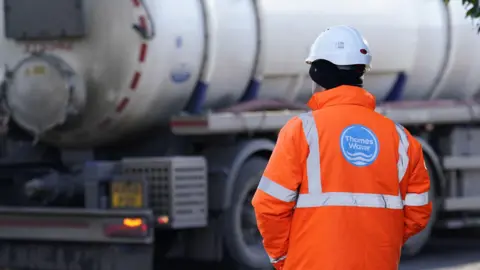Thames Water says it needs 59% bill rise to survive
 PA Media
PA MediaThames Water has warned it will not survive unless it is allowed to increase water bills by almost 60% over a five-year period.
The UK’s largest water company demanded the bill hike after the wider water industry issued a scathing response to a proposed cap from the regulator for water bill rises.
In July, regulator Ofwat proposed an average £19 a year ceiling on water bill rises, with a final decision due in December.
But the water industry has argued the increase is not enough and said there was a risk that companies would not be able to raise enough investment to stop things like sewage spills.
Water firms have faced a fierce backlash over sewage discharges and leaks in recent years. Critics have also said companies have historically neglected investment in favour of paying executive bonuses and shareholder dividends.
It has led to a stand-off between regulator Ofwat and water companies over how much customers should pay.
Thames Water has been in the spotlight and faced questions over whether it can survive as it struggles under a £15.2bn debt pile and only has enough cash to fund its operations until the end of May next year.
When all water firms put forward requests to Ofwat for bills from 2025 to 2030, Thames originally asked the regulator to increase bills by 44%, but the regulator proposed a 23% rise.
On Wednesday, the company announced it wanted to go further, hiking bills by as much as 59%. The proposed changes in bills do not take account of inflation.
Such a move would take the average annual water bill to £638 per customer by 2030. Average bills are currently around £443.
Chris Weston, chief executive of Thames Water, said the money from higher bills would be invested in new infrastructure and improving services.
"They [customers] are not being asked to pay twice, but to make up for years of focus on keeping bills low," he said in a response to the regulator.
Mr Weston claimed Ofwat's current proposal - a 23% rise in bills - would be "neither financeable nor investible".
"It would also prevent the turnaround and recovery of the company," he added.
'No one will invest in water'
The warning came after Water UK, the industry body for all water firms, said bills needed to be increased by more in order to stop leaks.
David Henderson, chief executive of Water UK, told the BBC people were "right to be angry" at water companies over sewage spills, but said the country had a "system that's tired and it's old".
"If Ofwat doesn't change its proposal then investors may not stump up the money that we need," Mr Henderson said.
"No rational investor is going to put their money into water right now."
Ofwat has proposed a water bill increase limit as part of its draft decision on the business plans of water companies from 2025 to 2030.
The proposed increase is a third less than the amount requested by water firms, who argue companies must be able to charge more in order to spend money on fixing leaks.
Mr Henderson rejected the idea that the amount paid out in dividends to investors in recent years was part of the reason there was not enough money for companies to invest, rather than just bills being lower.
He said returns were set by the regulator Ofwat, adding: "If you want investors to put their money into the UK they need to receive a return."
He said without more investment, building projects such as hospitals and housing developments would potentially not be built.
'Absolute balderdash'
The GMB union called the claims from water companies "absolute balderdash".
"Water companies have had the money, failed to invest in plugging leaks and preventing sewage spills and now want more money to do what they failed to do," said Gary Carter, GMB's national officer.
An Ofwat spokesperson told the BBC it would carefully consider all responses to its proposals, which were required by midday on Wednesday.
"We expect to receive responses from many organisations, including water companies, customers, environmental and consumer organisations and investors," they said.
"These are likely to reflect a diverse range of views on the proposals we have made."
Raw sewage spills into England's rivers and the sea by water companies more than doubled last year.
A BBC investigation earlier this year revealed sewage had potentially been released illegally 6,000 times in 2022 by England's water companies in breach of their permits.
Thames Water, along with Yorkshire Water and Northumbrian Water face a total of £168m in fines from the regulator for a "failure" to stop years of leaks.
Ofwat has suggested a ban on director bonuses until leaks and sewage spills are dealt with.
